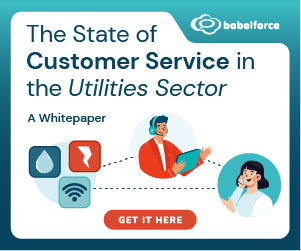Corentin Messerschmidt at Odigo explains how voice is still the dominant channel in customer service, which means optimising speech recognition software using the latest best-in-class technology is a must.
The good news is that solution providers are making quality improvements to speech processing software that are producing new sources of data that are not just usable, but actionable.
Speech recognition, or speech processing, is the analysis of sound in such a way as to make words and phrases searchable. When it comes to customer experience (CX), speech processing software is essential to gathering customer information and improving communication and experience with them.
Efforts are being made by the top solution providers in the Contact Centre as a Service (CCaaS) industry to continuously benefit from the best improvements in speech recognition capabilities.
Why? Simply put, the rumours of the voice channel’s demise have been greatly exaggerated. ContactBabel’s yearly contact centre report for 2022 recently showed that 63.5% of inbound interactions were with a live agent.
Email, at 17.2%, was the next most prevalent, which then dropped to web chat, at 6.8%. Live agent calls may be at their lowest recorded level so far but a mixture of individual and demographic preferences, as well as the necessity to discuss complex unique customer contexts, mean voice is still the dominant channel.
Speech Recognition and Language Learning
Developers are making quality improvements to speech processing software that are producing new sources of data that are not just usable, but actionable.
Innovations like speech-to-text, which converts spoken language into a readable format (and its cousin, text-to-speech, which translates the written word into audible content) are being increasingly optimised, and by 2025 40% of all inbound voice communications to contact centres will use speech-to-text technology.
However, the process of optimising speech recognition is similar to teaching somebody a foreign language. You may be one of the many people taking language lessons for business purposes in your free time, or perhaps English is not even your native tongue.
That’s why such a familiar comparison can be helpful when discussing the must-haves for speech processing software.
Speech Processing Software Must Be Able to Handle Real-time Conversations
A prime reason for learning a foreign language as an adult is to be able to converse functionally in business settings. Of course, conversation goes beyond the mere understanding or reciting of words based on their face value.
The more about speech cues you learn — especially subtle ones — the better your conversation skills, and therefore the more valuable your interactions with colleagues will be. Learning conversational skills requires more than simple input, however. It requires practice and repetition.
There is a strong parallel to be drawn here with speech recognition. Voice bots must be able to handle conversations in order to help customers.
Machine learning (ML) software can be trained to recognise cues from past interactions with customers so that automated systems can handle routine interactions, such as questions about a store’s hours, without the need for a human agent to intervene. The better a bot can pick up on conversational nuance, the better served your customer base will be.
Speech Recognition Software Should Be Able to Pick Up On Context
It goes without saying that the language used in business settings will not be the same as that used in social contexts, which is a tricky thing for adult language learners.
If a programmer expects to be able to use the same language with their 5-a-side football teammates as they do at work, it can grate and interrupt the flow of a conversation with language that seems out of place.
Similarly, the language needed for optimised automated customer service options should be able to deeply learn the vernacular and themes of its intended context.
It’s very common for specific business domains, whether they’re brands, products or even entire verticals, to have specialised language and contexts. Luckily, speech recognition software is up to the task of learning the language that your business operations are predicated upon.
Improvements in speech processing based on leaps in artificial intelligence (AI) and natural language processing (NLP) technologies make speech recognition more trustworthy than ever. Their potential to answer the growing need for personalisation in CX makes its inclusion in CCaaS solutions a must.
Speech Processing Software Positively Reinforces Brand Identity
Reviews can have a significant influence on how people view a brand. Language learning apps and online teaching programs rely on popularity and reviews as much as any business.
If these programs do a good job of imparting knowledge and gain good reviews it not only reinforces a positive brand identity but a good reputation which can turn customers into promoters. Interestingly enough, many language programs also rely on speech recognition to assess pronunciation.
Another strong component of brand identity is security. When you purchase a subscription to an app or language learning program a confidential record of your payment schedule is created.
Furthermore, as these programs often include an element of gamification to progress through the levels, your personal learning history is kept as well. Contact centres also work with a lot of customer data such as passwords and transaction history.
Speech recognition-powered security measures such as voice biometrics, used by HMRC since 2018, can help cut down on the mundanities of CX, like the necessity of answering security questions, while making sure that the only ones who can get access are the customers themselves.
A brand that takes security and privacy seriously is a successful brand.
Author: Guest Author
Published On: 21st Mar 2022
Read more about - Guest Blogs, Odigo





































